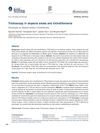March 2024 in “Nutrients” Alopecia Areata is linked to specific gut bacteria and metabolites, indicating a complex gut microbiome.
 March 2024 in “Clinical, cosmetic and investigational dermatology”
March 2024 in “Clinical, cosmetic and investigational dermatology” Severe alopecia areata greatly impacts quality of life, mental health, and daily activities.
 March 2024 in “Skin research and technology”
March 2024 in “Skin research and technology” High CRP levels could indicate vitamin D deficiency in people with alopecia areata.
 February 2024 in “Curēus”
February 2024 in “Curēus” A balanced diet with proteins, vitamins, and minerals is crucial for managing skin disorders.
 February 2024 in “Skin research and technology”
February 2024 in “Skin research and technology” LC-OCT is a promising tool for diagnosing and monitoring Alopecia areata.
 February 2024 in “Biomedicines”
February 2024 in “Biomedicines” Hormones like androgens, estrogen, thyroid hormones, and stress hormones can contribute to hair loss, and treatments target these hormonal imbalances.
 February 2024 in “Lasers in Medical Science”
February 2024 in “Lasers in Medical Science” Lasers and energy-assisted methods show promise for treating hair loss, but more research is needed.
 February 2024 in “Scientific reports”
February 2024 in “Scientific reports” Four genes are potential markers for hair loss condition alopecia areata, linked to a specific type of cell death.
 February 2024 in “Medicina-lithuania”
February 2024 in “Medicina-lithuania” Obesity and bariatric surgery can cause hair thinning and temporary hair loss due to nutritional deficiencies and stress.
 February 2024 in “The Open dermatology journal”
February 2024 in “The Open dermatology journal” Alopecia Areata affects people of all ages worldwide, is likely caused by genetic and environmental factors, and can lead to stress and depression, highlighting the need for treatments that address both physical and mental health.
 February 2024 in “Actas dermo-sifiliográficas/Actas dermo-sifiliográficas”
February 2024 in “Actas dermo-sifiliográficas/Actas dermo-sifiliográficas” Most alopecia areata patients in the study were women, aged 15-49, with patchy hair loss and often had other health conditions.
 January 2024 in “Dermatology practical & conceptual”
January 2024 in “Dermatology practical & conceptual” Male gender and family history predict alopecia areata recurrence.
 January 2024 in “International Journal of Molecular Sciences”
January 2024 in “International Journal of Molecular Sciences” Blocking the protein CXCL12 with a specific antibody can increase hair growth in common hair loss conditions.
 January 2024 in “American journal of clinical dermatology”
January 2024 in “American journal of clinical dermatology” Ritlecitinib is safe and well-tolerated for treating alopecia areata in patients aged 12 and older.
 January 2024 in “JEADV clinical practice”
January 2024 in “JEADV clinical practice” The study helps doctors use patient images to understand and apply SALT scores for treating severe alopecia areata.
January 2024 in “Biomedicines” The review shows that skin symptoms like chronic fungal infections, hair loss, and skin depigmentation are key for early detection and management of APECED.
 January 2024 in “JEADV clinical practice”
January 2024 in “JEADV clinical practice” Patients were highly satisfied with shared medical appointments for hair loss treatment.
 January 2024 in “Dermatologic therapy”
January 2024 in “Dermatologic therapy” Tofacitinib is a safe treatment for hair loss in children, but long-term use may be needed for best results.
 January 2024 in “JEADV Clinical Practice”
January 2024 in “JEADV Clinical Practice” Patients with certain skin diseases are willing to spend significant time on treatment, indicating a high impact on their lives and a need for better treatments.
 January 2024 in “Archives of dermatological research”
January 2024 in “Archives of dermatological research” Both treatments for alopecia areata showed similar modest effectiveness.
 January 2024 in “Skin Research and Technology”
January 2024 in “Skin Research and Technology” Oral tofacitinib may be an effective future treatment for children with severe alopecia areata, but more research is needed.
 January 2024 in “Journal of the American Academy of Dermatology”
January 2024 in “Journal of the American Academy of Dermatology” The document concludes that more research is needed to confirm if COVID-19 vaccines cause a type of hair loss called alopecia areata.
 January 2024 in “Skin appendage disorders”
January 2024 in “Skin appendage disorders” Using growth factors and microneedling shows promise for hair regrowth in Alopecia Areata, but more research is needed.
 January 2024 in “Elsevier eBooks”
January 2024 in “Elsevier eBooks” Increasing regulatory T cells may help treat alopecia areata by reducing autoimmunity and promoting hair growth.
 December 2023 in “International Journal of Biological Macromolecules”
December 2023 in “International Journal of Biological Macromolecules” Chitosan nanoparticles loaded with Minoxidil were effective for hair growth but released the drug more slowly than the amphiphilic derivative.

Upadacitinib effectively treated a patient with multiple inflammatory conditions.
 December 2023 in “Research Square (Research Square)”
December 2023 in “Research Square (Research Square)” These specific gene polymorphisms are not linked to Alopecia Areata in Egyptians.
 December 2023 in “Portuguese journal of dermatology and venereology”
December 2023 in “Portuguese journal of dermatology and venereology” Trichoscopy can reliably distinguish between alopecia areata and trichotillomania.
 December 2023 in “Journal of dermatology”
December 2023 in “Journal of dermatology” Adults and adolescents with severe alopecia areata are willing to take significant health risks for a better chance of hair regrowth.
 December 2023 in “Dermatology and therapy”
December 2023 in “Dermatology and therapy” Japanese patients and physicians often disagree on the severity of Alopecia Areata and treatment satisfaction, needing better communication and treatments.



























